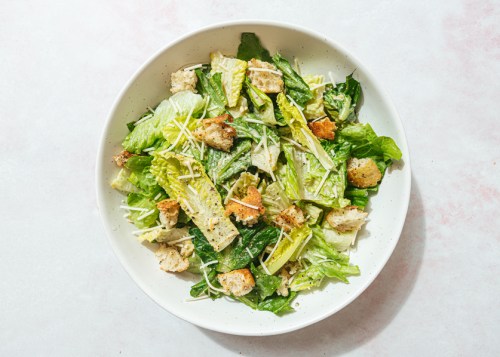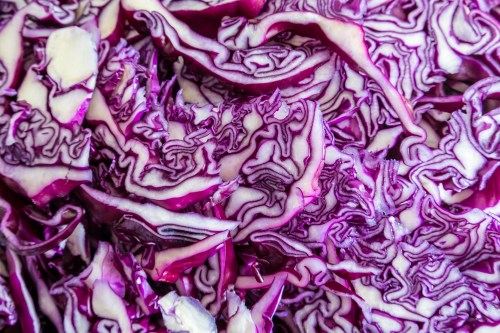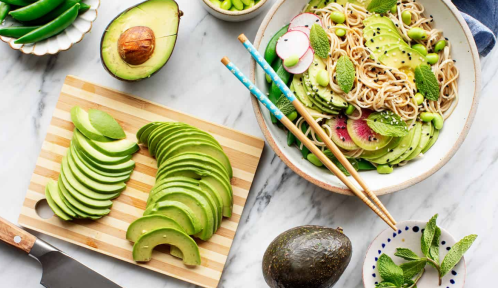We recently learned that by the time we reach adulthood, we’ve likely lost about half of our taste buds. This means that our body’s receptors that are responsible for decoding flavor, aka the five basic tastes—sweet, sour, salty, bitter, and umami—can lose their ability to savor foods…which might be why food might start tasting a little blander as you age. (This and worsening hangovers by the day? Ugh.)
Experts in This Article
registered dietitian nutritionist and founder of Vivrant Nutrition
sports dietitian
But rest assured: Just because we lose taste buds with age doesn’t mean we’re destined to eat mediocre-tasting food with minimal flavor forever. If you’ve ever watched a reality TV cooking show, you’ve likely heard judges preaching that umami is everything when it comes to making a restaurant-worthy dish. But what exactly is it? Umami was internationally recognized as the fifth basic taste based on psychophysical, electrophysiological, and biochemical studies in the late 1900s. It’s also known as the “savory” taste and is present in the compounds glutamate, inosinate, and guanylate. You may also have heard of it referred to as a sodium salt product (monosodium glutamate or MSG) in the food industry used to enhance flavor.
Fortunately, these umami-enhancing compounds are naturally present in a host of foods registered dietitians recommend. Think: seaweed, miso, kimchi, and anchovies, to name a few. We spoke with RDs that shared their favorite umami-boosting ingredients that are not only exploding with tons of flavor but also filled with additional nutrients that will make you want to say oooooh-mami.
6 RD-approved umami-enhancing ingredients for restaurant-worthy meals
1. Seaweed
According to Marisa Silver, MS, RDN, a registered dietitian of Vivrant Nutrition, this marine green is not only delicious on its own but also is great for adding into soups or stews. “What’s more, seaweed is one of the best food sources of iodine and tyrosine, which are needed for proper thyroid function,” Silver says. It’s also a key ingredient in dashi, an umami-rich, flavor-enhancing broth packed with bone health benefits.
Roxana Ehsani, MS, RD, CSSD, LDN, a registered dietitian nutritionist and national media spokesperson for the Academy of Nutrition and Dietetics, also agrees it’s one of the best umami-rich ingredients as it has the key amino acid (glutamate) responsible for activating the umami taste buds receptors. “Seaweed is rich in glutamate and is easy to incorporate into dishes to add flavor or eat on its own in a snack, like dried seaweed leaves,” Ehsani says.
2. Miso
Miso is another umami-rich ingredient Silver recommends due to its gut-healthy benefits. “The fermentation of soybeans makes miso and allows for the growth of beneficial probiotics,” Silver says. Additionally, this ingredient is a complete source of protein and contains manganese, vitamin K, copper, zinc, and other key vitamins and minerals.
Silver recommends adding miso paste to soups and shares her simple four-ingredient recipe, which is perfect for a cold rainy day. “I love to roast about three cups each of butternut squash and cauliflower, and blend it with 22 ounces of bone broth and two tablespoons of miso paste for a delicious soup,” she says.
3. Kimchi
Not only is kimchi made from microbiome-enhancing fermented cabbage, but it’s also a quick and easy way to add a punch of flavor thanks to its ultra-flavorful seasonings like fish sauce, chili pepper, and garlic. “Kimchi is fermented cabbage that’s packed with probiotics. Plus, it has vitamins A, C, K, folate, beta-carotene, choline, potassium, and calcium,” Silver says.
4. Aged Cheese
If funky, aged cheeses are your all-time favorite, good news: Silver says aged cheeses are great for adding tons of flavor to a recipe. She recommends kinds like cheddar, parmesan, Gouda, or Manchego. “Aged cheese is lower in lactose, so it is recommended for those who have trouble digesting this milk sugar. Aged cheese also contains protein and calcium, which are great for bone health,” she adds.
5. Anchovies
Anchovies are basically the secret flavor weapon for many chefs—and a key ingredient that makes Caesar salad dressing as delicious as it is. “These are small but mighty fish. Anchovies contain healthy omega-3 fatty acids, protein, selenium, calcium, niacin, and vitamin B12. A few anchovies go a long way to boost flavor in dips or over a salad,” Silver says.
6. Mushrooms
“Mushrooms, like dried shiitake, are rich in umami flavor and can be incorporated into pretty much any dish; add them to soups, stews, and stir-fries, or use them to make broths. They contain a few grams of dietary fiber and contain compounds that can reduce cholesterol levels, plus they’re a great source of vitamin D,” Ehsani says.
How to make umami-rich doenjang-jjigae stew:
Sign Up for Our Daily Newsletter
Get all the latest in wellness, trends, food, fitness, beauty, and more delivered right to your inbox.
Got it, you've been added to our email list.











